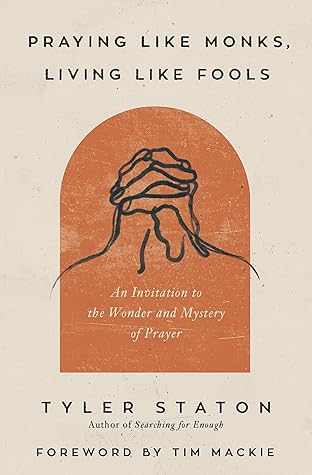More on this book
Community
Kindle Notes & Highlights
by
Tyler Staton
Started reading
April 17, 2025
Prayer invites you to learn to listen to God before speaking, to ask like a child in your old age, to scream your questions in an angry tirade, to undress yourself in vulnerable confession, and to be loved—completely and totally loved, in spite of everything.
I believe that God is loving enough that a conversation starter is all he needs to draw someone all the way home.
I’m more familiar with anxiety than I am with peace. I’m better acquainted with a subconscious drive to control the circumstances overwhelming me than with accepting the unburdening freedom promised in prayer.
Even in a very busy, very distracted world, people still make time for what really matters to them.
Prayer can’t be mastered. Prayer always means submission. To pray is to willingly put ourselves in the unguarded, exposed position. There is no climb. There is no control. There is no mastery. There is only humility and hope.
Before we can have faith that God will answer a given request, we simply have to learn to trust the character of the God we’re talking to.
God is looking for relationship, not well-prepared speeches spoken from perfect motives.
C. S. Lewis said of prayer, “We must lay before Him what is in us, not what ought to be in us.”14
“Hurry is not of the Devil; it is the Devil.”
“Be still.” The Latin term is vacate, from which we get the English word vacation.
Live like this world and this life is all you’ve got, and you’ll lose yourself in trying to be everything for everybody.
Jesus was intentional and interruptible. There’s a word for that posture: unhurried.
They embraced lives of intentional stillness as a discipline, but equally lives of interruptibility, refusing to ever latch their door, remaining constantly available, and making the need of their neighbor the highest priority.
God has to break our attachments to the world so we can truly love the world.
When Jesus taught his disciples to pray, he wasn’t teaching them to pray more or pray harder, but rather to pray differently.
It’s interesting to note that at no point does the serpent’s temptation become direct. Never does he say, “Here, try the fruit,” or anything of that sort. Instead, the serpent takes aim at Eve’s belief in the character of God.
He’s not asking Eve to eat the fruit; he’s chipping away at her trust in God.
Protestants typically call Jesus’ exemplary prayer “the Lord’s Prayer,” while Catholics simply name it the “Our Father.” I wonder if Catholics are onto something. Because every line of the prayer flows from here: “Our Father.” It all starts and ends with remembering who we’re talking to.
the biblical use of the word saint has nothing to do with human competence and everything to do with divine grace.
Prayer flows from the posture of our hearts toward God, not from reaction to the world around us.
it’s our wounds that God often uses to heal others, not our competencies.
If it’s the presence of the living God you want, confession is part of the deal—a really good part of the deal.
Eugene Peterson defines it, “Sin is a refused relationship with God that spills over into a wrong relationship with others.”
Jesus is nearest to us in “our weaknesses,” not our strengths.
When we come in and out of God’s presence in gathered communities with our deepest needs and secrets hidden, we are essentially saying, “Jesus’ victory is not enough. It’s not enough for me. Not enough for this. I just need more time. I can sort this out on my own.” How do we combat the insistent, internal narrative that was planted in us at the fall, that keeps us in a perpetual state of hiding and dressing ourselves up with our choice fig leaves? Confession.


